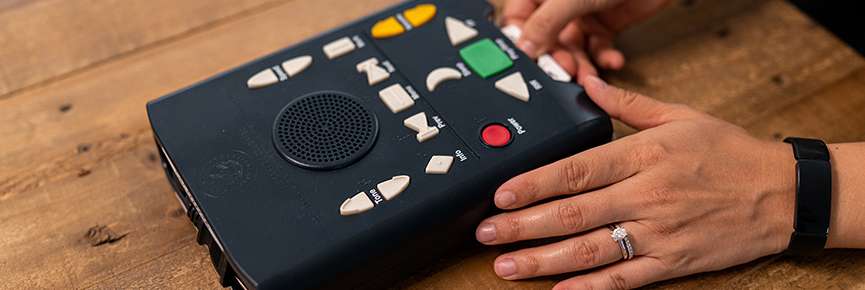
Thanks to technological improvements at the National Library Service for the Blind and Print Disabled (NLS) over the last several years, people who want to continue reading have more options than ever. And more digital advances are on the way.
Created by a 1931 Act of Congress, NLS is a free braille and talking book library service for people living with impaired vision or another condition that prevents them from using regular print materials. NLS circulates books and magazines in braille or audio formats through the mail or by download to a personal device free of charge.
Jim Denham, Access Technology Specialist at the Wisconsin Council of the Blind & Visually Impaired, says a lot of the people he works with are unaware of the range of services NLS offers.
“When some people think of NLS, they still think of getting books in the mail on cassette tapes,” Jim says. “But times have changed. Cassettes are out, and NLS now offers a variety of methods for getting digital books.”
Patrons can still get books in the mail. But gone are the days of a single book taking up multiple cassettes. For several years, borrowers have instead received books on small digital cartridges that connect to a digital talking book player, which is available on loan free of charge. And in a more recent change, patrons can now access several books on a single cartridge.
But people more comfortable with computers and mobile devices don’t have to sit by the mailbox for days waiting for a cartridge to arrive. For the last several years, NLS’s web-based Braille and Audio Reading Download (BARD) service has provided access to thousands of braille and talking books, magazines and other material via download to a computer. There are even BARD mobile apps for iPhone and Android, so you can download books to your phone or tablet.
And a recent addition, BARD Express, makes the download process even easier.
“It used to be that to read books electronically, you had to download the book and then transfer it to a device using a cable,” Jim says. “That was difficult for some clients because transferring and unzipping files can be tricky. Bard Express is a piece of software for Windows that makes the process of downloading books and transferring to external media like a cartridge or thumb drive much simpler.”
For fluent braille readers, NLS is in the process of rolling out a new service that could be a game changer. Within the next year, patrons will be able to borrow a digital e-Reader — a small, 20 cell refreshable braille display that allows you to download braille books directly from BARD and read them on the device. The digital e-Reader also enables users to download and read newspapers from NFB Newsline, a free news service that offers access to hundreds of news sources, emergency weather alerts, job listings and more.
“In a society where reading is so critical, we think it’s important to make people aware of NLS,” Jim says. “One of the most frequent comments I hear from clients whose vision is declining is that they wish they could still read. And I say, ‘Well, have you heard of NLS?’”
For more information about NLS, to sign up to start downloading braille and talking books from BARD, or to access daily newspapers through NFB Newsline, visit the Wisconsin Talking Book and Braille Library website, or call them at 800-242-8822.
Need help learning how to access BARD, download a book to your smartphone, or use any other NLS service? The Council is here for you! Call us at 608-255-1166 or 800-783-5213.

